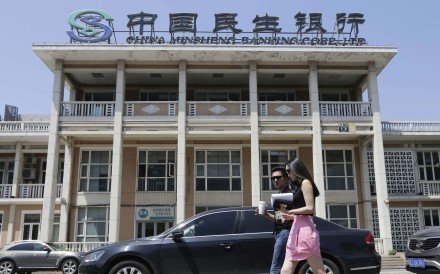The recent raft of global banking job cuts may have some Asian finance workers bracing themselves for a flurry of pink slips this holiday season, but industry watchers say it might be premature to push the panic button just yet.
Leading Western lenders from Germany’s Deutsche Bank and Commerzbank to the Netherlands’ ING Group have sent shockwaves through the industry in the last fortnight following announcements they were slashing a total of more than 20,000 jobs.
In Asia, Goldman Sachs grabbed headlines on reports it was cutting 30 per cent of its 300 investment banking jobs in the region, most of them in Hong Kong. In rival financial hub Singapore, British lender Barclays reportedly cut 100 jobs from its information technology operation.
Bad banks, even German ones, should be allowed to fail
Still, industry insiders are cautioning against reading the fresh bout of bloodletting as a sign that banking headcounts are going to plummet the way they did during the Global Financial Crisis.
Current cuts – which range from the axing of thousands of jobs in one go to staggered “micro layoffs” – stem from structural changes at under-pressure banks rather than expectations of a systemic economic shock, they say.
Singapore’s financial sector saw a 3 per cent drop in employment in the second quarter of this year, official figures show. In Hong Kong, government data showed a seasonally adjusted 0.3 per cent growth in finance and business services jobs in the three months to March.
“My take is that the job market for the banking sector in Hong Kong and Singapore is going to remain soft for some time,” said Gary Lai, managing director for Southeast Asia at recruitment firm Charterhouse Partnership.
Deutsche Bank’s plight deserves a degree of sympathy
“There is no reason to believe it’s going to be far worse than what we have been seeing in previous years. Of course, if there’s a global recession then all bets are off,” Lai said.
Despite the gloomy headlines, Lai said hiring was continuing in areas like technology, compliance and risk, as banks vied to take on competition from upstart fintech players outside the regulated financial sector.
And Tim Klimcke, director of financial services and banking for the Singapore branch of headhunting firm Robert Walters, said there was steady hiring in financial governance and technology as “traditional banks are trying to embrace technology in a more aggressive fashion”.
 Bankers pass the Commerzbank headquarters in Frankfurt, Germany. Photo: AP
Bankers pass the Commerzbank headquarters in Frankfurt, Germany. Photo: AP
In a report released on Wednesday, the International Monetary Fund said European banks’ woes reflected an urgent need for reform as they faced medium-term pressure from a legacy of non-performing loans and outmoded business models.
Chinese banks sail into uncharted waters as they expand globally
“In some cases, weak banks will have to exit and banking systems will have to shrink,” it said.
Bernard Aw, an economist with IHS Markit, said job creation in Singapore was likely to see an uptick following positive economic figures released in September. Hong Kong job growth remains hampered by the “subdued global economy”, he said.
Given the job cuts in the European banking sector, regional lenders pressured to conduct retrenchment exercises might do so in tranches, some Asian recruiters said.
 A pedestrian passes a Barclays bank branch in London. The bank was thrust into the spotlight in Asia in January after reports it was axing 1,000 jobs worldwide. Photo: EPA
A pedestrian passes a Barclays bank branch in London. The bank was thrust into the spotlight in Asia in January after reports it was axing 1,000 jobs worldwide. Photo: EPA
“I have seen a couple of micro layoffs in Asia including Hong Kong this year,” said Rouella Landicho, a manager with recruitment firm Morgan McKinley in Hong Kong.
“Definitely one of the main reasons why financial services firms are employing this method is to avoid negative publicity similar to what happened to the likes of Barclays and Standard Chartered Bank… in the beginning of 2016 and 2015,” she said.
Goldman Sachs’ job cuts show investment banking has become a low margin business
Barclays was thrust into the spotlight in Asia in January following news reports it was axing 1,000 jobs worldwide including investment banking positions in Australia, Indonesia, Malaysia, the Philippines South Korea, Taiwan and Thailand.
The Asia-focused Standard Chartered Bank – whose biggest shareholder is Singapore’s sovereign wealth fund Temasek Holdings – cut 15,000 jobs out of a global headcount of 86,000 last November, including an unspecified number of positions in the city state.
 Asia-focused Standard Chartered Bank cut 15,000 jobs out of a global headcount of 86,000 last November. Photo: Reuters
Asia-focused Standard Chartered Bank cut 15,000 jobs out of a global headcount of 86,000 last November. Photo: Reuters
“Obviously the banks have now come to the realisation that making large cuts of 900 or 1,000 jobs at a time is not going do you any favours in terms of publicity,” said Lai, the Charterhouse headhunter.
A Singapore-based investment banker told This Week in Asia the subject of retrenchment had become commonplace in informal conversations with colleagues.
“I don’t think anyone is in panic mode…But you know at the back of your head there is a possibility your job could go,” said the banker.
Barclays names new Hong Kong chief as sector woes deepen
“All you can do right now is make sure the work your team produces is up to scratch,” he said.
Headhunters who urge finance workers against overbearishness on the job market suggest workers take on multiple roles to stay relevant.
With investment banks, “the decision for them to cut is a balancing act between being over staffed when revenues are low and being understaffed if and when the market improves next year,” said Adam Jeffes, associate director for front office financial services in Hong Kong at Morgan McKinley.
The scale of any job cuts would “depend on market performance in the coming months,” Jeffes said.




No comments:
Post a Comment